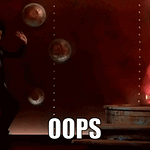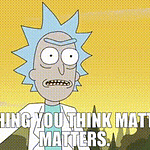Hi everyone—I’m so glad to have you here. What a week.
The story of Pinocchio has at least one thematic tie to our current inflationary political regime hell bent on debasing the currency and blaming the resulting rise in prices on anything but their own actions: lying makes things grow.
The Pinocchio story is about a lot of things, but largely about the tension between learning to take responsibility and not losing your sense of freedom and personal autonomy.
So let’s talk about lies. People lie, yes, but so can price signals.
When you give people money to spend, but that money didn’t come by working to take home a portion of the profits of an employer who is in the business of producing a good or service for the market, it means there is an artificially large demand without the market supply to meet it.
This is why too much intervention in the free market process creates ripples of accumulating distortions, as people continue making decisions based on the resulting price signals. They think things are okay, as evidenced by the money they have in the bank and the prices of goods and service at that moment, but don’t yet see the changes occurring in the system that, if visible, might cause these people to save, spend, and invest much differently.
Those intervening are lying about the reasons and the consequences. And the resulting consequences are effectively false information.
Here’s the latest in intervention news:
Russia's Sberbank will now be issuing a Mir card in partnership with China's UnionPay after Mastercard and Visa stopped operating in the country
U.S. Senators look to lock down Russia's gold reserves and apply secondary sanctions to any American entities knowingly transacting with or transporting gold from Russia’s central bank holdings, or selling gold physically or electronically in Russia.
Roman Abramovich, Russian oligarch and politician and owner of English Premier League football club Chelsea FC, has been sanctioned. This is a big deal. All UK assets have been frozen, and while Chelsea can still operate under a special license, Abramovich’s sale of the club is now on hold and will not be allowed to sell any more tickets—only season ticket holders can go to games for the foreseeable future. No merchandise sales, no player transfers, and no new new contracts either.
What’s going on? Well, as Nic Carter put it, America is quietly defaulting and encouraging the world to separate itself from the dollar system.
“America's Quiet Default: Seizing Russian holdings of American debt risks the role of the U.S. in the international system and opens the door to gold and bitcoin.”
Here’s a quick visual recap of the U.S. dollar’s journey from being selected as global reserve currency, originally backed by, i.e. redeemable, for gold, but eventually taken off the peg in 1971 and left to be a free-floating fiat currency which ushered in an era of unmitigated debasement and bailouts:
The petrodollar system, where dollars have to be used to transact in oil markets, kept demand for the dollar artificially propped up for awhile, but that’s drawing to a close now too, as Russia and China are now exploring alternative denominations.
And now that Sanction-topia is well underway, people are realizing it created a new, potentially worse, energy problem for which there is no easy fix.


Of all places, the Credit Suisse research team published a sober account of how bad things are, why this has everything to do with money, and why—I kid you not—Bitcoin is looking pretty good right about now.
“A crisis is unfolding. A crisis of commodities. Commodities are collateral, and collateral is money, and this crisis is about the rising allure of outside money over inside money. […]
After this war, ‘money’ will never be the same again… and Bitcoin (if it still exists then) will probably benefit.”



For the record, 1.) it is real and 2.) Bitcoin is almost certain to exist then. Understanding why that second one is overwhelmingly probable is alpha that Credit Suisse analysts haven’t yet attained or are understating publicly.
I make a point to never take someone, or some bank’s, word for it. It’s important to triangulate assessments using multiple, unrelated sources. In this case, even comedian and writer and commentator Russell Brand, who is about as far away from being a bank or corporate news pusher as you can get, is starting to see things come into focus in the same way:
“The law changes. The law is plastic. The law is the tool of the government. If there isn't a law to shut you down, they'll create one.”
—Russell Brand, from his recent news sendup on government sword rattling and the topic of cryptocurrencies titled, “While You’re All Distracted By Ukraine…”
Part of the reason it occurred to me to bring Pinocchio into this childish maelstrom of financial horror is because of a quote I was reacquainted with from the very excellent book by John Gray I read awhile back called The Soul of the Marionette. It’s a book about free will and consciousness, but like all great works it holds pieces of relevance that extend across multiple categories of human enterprise:
“The role of war in advanced societies now lies elsewhere. Twenty-four-hour news media generate a chronic state of low-intensity anxiety together with a tranquilizing sense of security.”
—John Gray, from The Soul of the Marionette: A Short Inquiry into Human Freedom
It’s a passage I reflected upon as I watched average gas prices in the U.S. reaching an all-time high of $4.17 per gallon, breaking the previous record of $4.11 set in July 2008.
Don’t worry, we’re being told in tranquilizing tones from our overlords: this is Putin’s fault, not ours. You may continue to trust us to do the right thing for you, always.
To be clear, this is not a political take, and I can’t think of many people who might be navigating the country through these rapids any less incompetently. This is about the money.
Some people have asked me why I decided to focus so much on money and economics these past few years. And my answer is this: when the U.S. government decided, without any discussion or vote, to extremely quickly and eagerly print 40% of all the dollars that had ever existed within the span of a few months in 2020, I realized that something was terribly amiss and things would inevitably get extremely bad in the years ahead and I could not afford to ignore this system of economic corruption any longer.
I studied music in school. I play video games and buy used books for fun. I assure you, this was not my first choice of how to spend my free time. But taking responsibility and making informed decisions is above all about prioritizing your values and owning your outcomes regardless of who was responsible for creating the circumstances you find yourself having to deal with.
I learned that all of this was to be expected, and understand now nwhy the government + the cartel of unelected bankers known as the Federal Reserve continue to print and spend despite record levels of debt: they’re committed to telling the fictional story that the problems we’re experiencing have nothing to do with them.


This is why I keep saying they’re not going to raise rates, and would eventually concoct or choose a scapegoat on which to place the blame. And guess what “news” got announced this week? “The Fed Needs To Delay Its Rate Hikes”
You see, they only needed to threaten to hike rates in order to get the market reaction they wanted. They know, as you and I do now, that if they raise rates too much they’ll get blamed for the recession and have to reverse the rate hikes again. They would rather barely raise them at all and blame Putin for the recession instead.
As any liar knows, the more you lie the more lies you have to keep track of in order to keep the lies going. To be good at deception and obfuscation, you don’t just need a poker face (one where your nose doesn’t grow and poke people), you also need an incredible memory. Which, given the amount of hypocrisy and contradiction spittling forth from the lips of career politicians these days, is harder than it looks.
There’s a line from the original Pinocchio story, published in 1883 by Carlo Collodi, that points out to the reader that it is a story about (to paraphrase Upton Sinclair) how difficult it is to get someone to understand something when his very nature depends upon his never being wrong:
“The story of Pinocchio and the Talking Cricket, in which one sees that bad children do not like to be corrected by those who know more than they do.”
To be fair, it’s often unclear whether establishment talking heads are deliberately lying to us or are so deeply blind and misinformed as a result of their cloistered academic, theory-laden belief system that they actually believe they’re right, and are perpetually perplexed by the ongoing cascade of predictions they keep getting perfectly wrong. It’s probably a rancid gumbo mashup of both, but that’s my point: given enough hubris and ego, the distinction between malice and incompetence is irrelevant.


U.S. Treasury Secretary (and former Federal Reserve Chair) Janet Yellen said this week, “I do not expect a recession to occur in the U.S.”
But check out what she said 5 years ago, a few years before the financial crisis I’m writing to you about today:
The lies keep piling up.
Now they’re lying to you about gas prices, that if you drive an electric car you won’t be effected. 🤡


'Explain it to me like I'm five' is very different from 'lie to me like I'm five and still believe in the tooth fairy,' but it appears I am one of only a precious few who can make this distinction.
Part of the lie is based on many people’s confusion about the nature of electricity, and thinking of it as a source when in fact it’s a medium:

And here we are, back to metals and electricity.
Perhaps it’s no coincidence that these also happen to be the two primary forms of money that people have used to store value through time: previously (for 5000 years) using precious metals such as gold and silver, and now via monetized energy secured through trust-minimized Nakamoto consensus across a distributed peer-to-peer network of nodes each with copies of the shared ledger of transactions.

So when the president recently signed an executive order instructing agencies to consider the creation of a US “digital dollar,” reflect on why they might prefer such an idea. Maajid Nawaz explained it very succinctly back in February using verbatim sound bites describing the intention of easier surveillance and control.
These bureaucrats and unelected economic dark lords are literally just telling the world their plan like some B-list movie villain.
“Digital cash could be programmed to ensure that it is only spent on essentials or goods which an employer or government deems to be sensible.”
Which brings me back to the story of Pinocchio.
Speaker, author, and clinical psychologist Jordan Peterson has written at length about the archetypal richness of the Pinocchio story, but one line in particular captures why I am returning to the story now, today, in March of 2022:
“And you remember in Pinocchio, he faces a lot of temptations. One is to be a liar; the other is to be a neurotic victim. That’s how he ends up in Pleasure Island where he just about gets sold into the salt mines and turns into a braying jackass … because it’s run by authoritarians.”
As you look around, as I do, trying to grab hold of any semblance of truth or honesty in a world gone hysterical and fearful about each new Current Thing™, increasingly willing to hand over personal liberties, privacy, and choice… take note: which characters are liars? Which are neurotic victims? Which are braying jackasses? And which are authoritarians?
Then, let your conscience be your guide.
Until next time 🤙,
Recommended Resources For Plan ₿
Swan. I became an official Swan partner because I love them so much. So if you're like me and just want an easy, automated way to buy bitcoin on the regular with the lowest fees in the game, head to https://swanbitcoin.com/Mulvey to get $10 in bitcoin for free ✨
Fold Card. Earn bitcoin on everything. You can win up to 100% back on every purchase, and every swipe is a chance to win a whole bitcoin. I use my own Fold card to pay for almost literally everything. If you use this referral link you get 5,000 sats free ✨






















Share this post